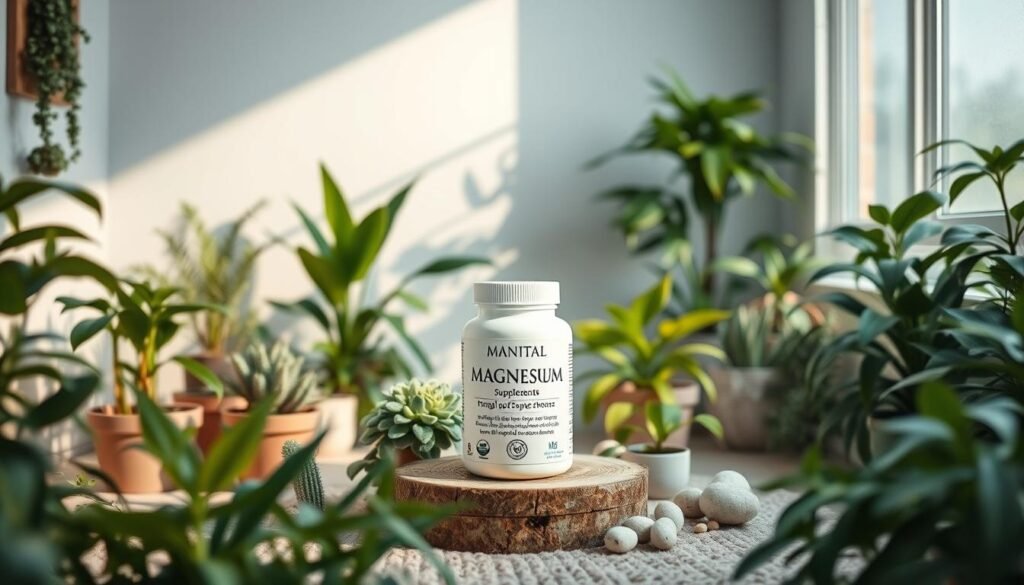Nearly 50% of U.S. adults don’t get enough magnesium through their diet. This essential mineral is vital for mental health, earning it nicknames like “the original chill pill” or “nature’s valium.” With anxiety disorders impacting 3.1% of Americans each year, more people are using magnesium supplements for anxiety relief.
This guide will explore how different magnesium forms can help manage anxiety. Magnesium affects neurotransmitter function, lowers stress hormones, and helps you sleep better. Yet, with many magnesium options out there, choosing the right one for anxiety is key. It’s also important to know how to add it to your wellness routine.
Key Takeaways
- Many adults lack sufficient magnesium, impacting mental health and anxiety.
- There are multiple forms of magnesium, each with unique benefits for anxiety relief.
- Proper supplementation can enhance neurotransmitter function, making it vital for mental wellness.
- Understanding the best magnesium for calming anxiety can lead to improved wellbeing.
- Regular consultation with healthcare professionals is essential for safe magnesium use.
Understanding the Importance of Magnesium in Mental Health
Magnesium is key for our mental health. It helps with our emotions and anxiety. Involved in over 600 body reactions, it’s vital for energy and brain chemicals. By taking enough magnesium, we can improve our mood. This is crucial for tackling anxiety and depression.
The recommended magnesium intake for adults is 310 to 420 mg daily. Yet, many don’t get enough, leading to magnesium deficiency. This shortage can link to anxiety disorders. That’s why using magnesium supplements for anxiety might help.
A study found that taking 125-300 mg of magnesium glycinate helped with major depression in under a week. This shows how magnesium aids in magnesium and mood regulation. Its absorption and storage in our bodies underline its importance for mental health.
Certain people are more at risk of not having enough magnesium. This includes older adults, those with alcohol use disorders, and people with type 2 diabetes. They should watch their magnesium intake closely. Eating foods like leafy greens, nuts, and whole grains can help support your mental and overall health.
| Magnesium-Rich Foods | Magnesium Content (mg per serving) |
|---|---|
| Spinach (1 cup, cooked) | 157 |
| Almonds (1 oz) | 76 |
| Black Beans (1 cup, cooked) | 60 |
| Avocado (1 medium) | 58 |
| Banana (1 medium) | 32 |
In summary, magnesium is very important for our mental health. Keeping magnesium levels up through diet, and maybe supplements, can help those with mood issues.
The Connection Between Magnesium Deficiency and Anxiety
A strong link exists between not having enough magnesium and feeling anxious. When magnesium levels drop, people can experience tiredness, stress, and shifts in mood. Magnesium plays a key role in handling cortisol, a stress hormone. If you’re always stressed, it can make the issue of low magnesium worse. This leads to a harmful cycle that affects your mental health.
Today’s farming methods have cut down magnesium in soil by up to 80%. Because of this, our food might not have enough magnesium for our needs. Even though folks need about 320mg daily, about 70% of Americans don’t get enough. Not having enough magnesium can make anxiety worse and negatively affect mental health.
Studies show that magnesium helps balance brain chemicals. It stops glutamate, a brain chemical that can make you feel excited, while boosting GABA, which helps you relax. This shows just how important magnesium is for keeping anxiety at bay and enhancing mental health.
Not having enough magnesium can cause anxiety, sleep troubles, and more muscle tension. Bad sleep and lots of stress make magnesium levels drop even more. This starts a bad cycle that’s tough on your body and mind. Knowing how low magnesium affects your anxiety is the first step towards managing it and feeling better.
| Symptoms of Magnesium Deficiency | Effects on Mental Health |
|---|---|
| Fatigue | Increased anxiety levels |
| Higher stress | Worsening mood disorders |
| Sleep disturbances | Enhanced feelings of irritability |
| Muscle cramps | Reduced overall mental resilience |
| Headaches | Potential onset of depression |
How Magnesium Works to Alleviate Anxiety Symptoms
Magnesium is key in treating anxiety by affecting the body’s nerves. It blocks hyperactive signals while boosting calming ones in the brain. This helps lower anxiety, especially by impacting neurotransmitters. Research shows magnesium improves mood by managing stress hormones and boosting mental resilience.
Low magnesium can make anxiety worse. Adding magnesium to your diet or as supplements might help. People with anxiety could see benefits in a week. The best amount to take is between 310 mg and 420 mg daily.
- Magnesium supplements may lessen the feeling of anxiety.
- Magnesium citrate is easily absorbed, making it more effective.
- Magnesium helps control stress hormone cortisol, keeping you balanced during stress.
Magnesium affects neurotransmitters like serotonin, enhancing calmness and well-being. Getting enough magnesium can help reduce anxiety symptoms considerably.
| Form of Magnesium | Potential Benefits | Recommended Dosage |
|---|---|---|
| Magnesium Citrate | Higher bioavailability; effective for anxiety | 100-360 mg per day |
| Magnesium L-Threonate | Cognitive enhancement; aids in anxiety reduction | 150-300 mg per day |
| Magnesium Glycinate | Calming properties; great for sleep | 200-400 mg per day |
| Magnesium Orotate | Supports gut health and anxiety | 200-400 mg per day |
Which Magnesium is Best for Anxiety: A Comprehensive Overview
Choosing the right magnesium can significantly ease anxiety symptoms. There are many types of magnesium, each offering unique benefits and how well they are absorbed by our bodies. Knowing which magnesium works best for anxiety relief is key for anyone looking to support their mental health.
Exploring Different Forms of Magnesium
Magnesium comes in several forms like magnesium glycinate, magnesium taurate, magnesium oxide, and magnesium citrate. Magnesium glycinate is highly regarded for its effectiveness in combating anxiety, thanks to its excellent absorption and soothing effects. Magnesium taurate also has a good absorption rate. It might help with both anxiety reduction and heart health. However, magnesium oxide and citrate don’t absorb as well, which might make them less effective for easing anxiety.
Comparing Bioavailability of Magnesium Forms
It’s crucial to understand how well different magnesium forms are absorbed. This knowledge determines their effectiveness in managing anxiety. Here’s a table showing the bioavailability and main benefits of each magnesium form:
| Type of Magnesium | Bioavailability | Primary Benefits |
|---|---|---|
| Magnesium Glycinate | High | Calming, reduces anxiety, improves sleep quality |
| Magnesium Taurate | High | Heart health, neuroprotective properties, alleviates anxiety |
| Magnesium Oxide | Low | Digestive health, mild laxative effect |
| Magnesium Citrate | Moderate | Promotes regularity, may help with anxiety symptoms |

Common Types of Magnesium for Anxiety Relief
Magnesium is key for mental well-being. Different types offer unique benefits for easing anxiety. Knowing the varieties helps pick the right supplement for individual needs.
Magnesium Glycinate and Its Calming Properties
Many prefer magnesium glycinate for its calming effects. It’s absorbed well and usually doesn’t cause stomach upset. People say it helps them sleep better and feel less anxious, which is great for mental clarity.
Magnesium Threonate: The Brain-Boosting Option
Magnesium threonate is great for the brain. Studies show it can boost magnesium in brain cells. This improves mood regulation. It’s perfect for those wanting better focus and anxiety management.
Magnesium Taurate for Neuroprotection
Magnesium taurate mixes magnesium and taurine, protecting the brain. It might lower blood pressure and boost heart health. It also calms, helping those with stress-related anxiety.
Magnesium Citrate and Its Digestive Effects
Magnesium citrate is known for aiding digestion. But, it might not be the best for anxiety relief. It’s highly bioavailable, making it good for digestive health over anxiety. Those interested in magnesium malate for anxiety might like it. It helps mental and physical health thanks to its absorption.
| Type of Magnesium | Benefits | Absorption Rate | Ideal Use For |
|---|---|---|---|
| Magnesium Glycinate | Calming properties, improved sleep | High | Anxiety, insomnia |
| Magnesium Threonate | Cognitive enhancement, emotional regulation | Very high | Focus, anxiety |
| Magnesium Taurate | Neuroprotection, blood pressure support | Good | Anxiety, heart health |
| Magnesium Citrate | Digestive health | Good | Digestion, general magnesium needs |
Culinary Sources of Magnesium: Food First Approach
A diet rich in magnesium is crucial for good health, especially mental well-being. Supplements help, but eating foods high in magnesium is best for meeting daily needs. These foods include:
Top Foods Rich in Magnesium
- Leafy greens such as spinach and Swiss chard provide about 150 milligrams of magnesium per cup.
- One ounce of nuts like almonds or cashews contains around 80 milligrams of magnesium.
- Legumes, particularly black beans, offer about 60 milligrams per half-cup.
- Whole grains, including brown rice and whole wheat bread, give moderate amounts—about 40 milligrams and 45 milligrams, respectively.
- Avocados are a delicious option with 44 milligrams of magnesium per cup.
- Cooking oats yields roughly 30 milligrams of magnesium per half-cup serving.
To reach the daily magnesium need of around 400-420 mg for men and 310-320 mg for women, follow the best dietary practices. However, modern issues like soil depletion affect this. Less mineral-rich soil means crops have lower magnesium, impacting food quality worldwide.
How Soil Depletion Affects Magnesium Levels in Foods
Soil depletion and intense farming decrease food’s magnesium content. Many don’t realize about half of Americans lack enough dietary magnesium. Since magnesium is key in over 300 body processes, consistent intake from food is crucial.
Dosage Recommendations for Magnesium Supplements
Finding the right magnesium dose for anxiety is key. It helps get the benefits while avoiding risks. People need different amounts based on their health, age, and how they live. Most adults should get 310 to 420 mg every day. This depends on if they are male or female and their age. Talking to a doctor can help you find the safest and most effective dose.
General Guidelines for Magnesium Intake
Studies show that taking 75 to 360 mg of magnesium daily can help with anxiety. The National Institutes of Health (NIH) gives guidelines based on your age and if you’re male or female:
| Age Group | Male (mg) | Female (mg) |
|---|---|---|
| 19–30 years | 400 | 310 |
| 31–50 years | 420 | 320 |
| 51+ years | 420 | 320 |
It’s important to keep magnesium from supplements under 350 mg daily to avoid side effects. Eating too much over a long time can lead to serious problems, like magnesium toxicity.
Consulting with Healthcare Professionals
Before starting magnesium supplements, talk to a healthcare professional. They can give advice that fits your health situation and medications. Some drugs can interact with magnesium, so it’s important to be careful.
Choosing the right magnesium amount for anxiety with your doctor’s help can improve your mental health while keeping you safe from side effects.
Potential Side Effects and Safety of Magnesium Supplementation
It’s important to know the safety and side effects of taking magnesium. This mineral is usually safe when taken in the right amounts. However, taking too much can cause problems. Knowing about these risks helps people stay healthy while using magnesium supplements.
Understanding Magnesium Toxicity Symptoms
Symptoms of too much magnesium can vary. Some common signs include:
- Low blood pressure
- Lethargy or extreme fatigue
- Muscle weakness
- Nausea and vomiting
- Confusion or changes in mental status
Keeping an eye on how much magnesium you take is important. Talking to a doctor can help you understand how to use magnesium safely.
Who Should Avoid Magnesium Supplements?
Some people need to be extra careful with magnesium supplements. They include:
- People with kidney problems, because they might not be able to get rid of extra magnesium
- Those on certain drugs that magnesium might affect, like Eplerenone or Glycopyrrolate
- Pregnant or breastfeeding women should not take high doses without talking to a doctor
Checking with a healthcare pro is key for these individuals. It helps avoid any bad effects from magnesium. Staying informed about the use of magnesium supplements is essential for good health.

The Role of Lifestyle Changes in Managing Anxiety
Making lifestyle changes is key to managing anxiety effectively. Along with magnesium supplements, adding exercises, eating well, and sleeping enough are crucial. These steps help improve your mental health.
Incorporating Exercise and Stress Reduction Techniques
Regular physical activity helps manage anxiety. Activities like yoga and meditation release endorphins, boosting your mood. Regular exercise acts as a stress reliever, helping tackle anxiety better.
- Walking or jogging for 30 minutes a day can significantly reduce anxiety symptoms.
- Yoga promotes relaxation while improving flexibility and strength.
- Mindfulness practices, including deep breathing exercises, increase awareness and foster a sense of calm.
Importance of Balanced Nutrition and Sleep Hygiene
A balanced diet is essential for mental health. Eating the right foods supports brain function and emotional stability.
Key nutritional elements include:
- Fruits and vegetables provide essential vitamins and minerals.
- Omega-3 fatty acids found in fish have beneficial effects on cognitive function.
- Whole grains promote steady energy and reduce mood swings.
Sleep hygiene is also very important. Sleeping well at night helps you recover from stress and builds emotional strength. A relaxed bedtime routine and a quiet sleep space help you rest better.
| Lifestyle Change | Benefit | Tip |
|---|---|---|
| Regular Exercise | Reduces anxiety and improves mood | Set a schedule for daily activity |
| Mindfulness Techniques | Enhances awareness and promotes calm | Try apps or local classes |
| Balanced Diet | Supports cognitive function and emotional well-being | Incorporate more fruits, veggies, and whole grains |
| Good Sleep Hygiene | Increases emotional resilience | Establish a regular sleep schedule |
Adopting these changes can boost magnesium’s benefits for mental health. It creates a well-rounded approach to anxiety management.
Combining Magnesium with Other Anxiety Treatments
Using magnesium with other anxiety treatments can make a big difference. It helps by tackling the root causes of anxiety. Adding holistic treatments with magnesium boosts emotional stability and coping skills.
Holistic Approaches to Mental Wellness
Trying holistic methods can make mental health care more rewarding. Yoga, meditation, and acupuncture are known for lowering stress. Adding magnesium to these practices can boost their calming effects.
Eating magnesium-rich foods or taking supplements can help. This, paired with meditation, offers a peaceful mindset.
Integrative Methods for Anxiety Management
Mixing different therapies can help with anxiety symptoms. This mix can include lifestyle tweaks, mental therapy, and diet changes. L-theanine from green tea also lowers anxiety levels.
Using magnesium with L-theanine boosts relaxation and sleep. This approach lets people find what works best for them.

Research Findings on Magnesium and Anxiety Relief
Studies on magnesium’s effect on anxiety have been increasing. They show how magnesium might help reduce anxiety. But, we need more research to fully get how it works.
Many studies confirm magnesium helps with mental health.
Recent Studies Supporting Magnesium Use
It’s found that almost half of Americans don’t get enough magnesium. They need about 300 to 400 mg daily. Eight studies looked into magnesium and anxiety. Four of these studies showed good results for easing anxiety.
A significant study in 2018 involved 126 people. It showed that taking magnesium chloride helped reduce anxiety and depression signs. This was clear from the scores on the PHQ-9 and GAD-7 scales.
Future Directions in Research
Magnesium’s role in mental health is getting a lot of attention. It seems promising, but we still need more proof. Online, magnesium topics are very popular, with billions of views on TikTok.
However, we must do more thorough research. Magnesium might help make more serotonin and melatonin. This could improve mood and sleep, lowering anxiety.
Conclusion
Magnesium plays a big role in easing anxiety, a fact that cannot be ignored. Many people don’t get enough magnesium, which affects their mental health. Studies show that not having enough magnesium raises stress levels, which can make anxiety worse. So, understanding the different kinds of magnesium and their benefits is key.
There are effective magnesium forms like magnesium citrate and magnesium glycinate that help reduce anxiety. Magnesium citrate is easy for the body to absorb. Magnesium glycinate is gentle and helps calm the nerves. Using these alongside lifestyle changes can help control anxiety better.
To make the most of magnesium’s benefits, it’s important to figure out what your body needs. Talking to health experts about supplements can help. They can suggest the best type and amount of magnesium for you. This way, you can improve your mental health and feel better overall.